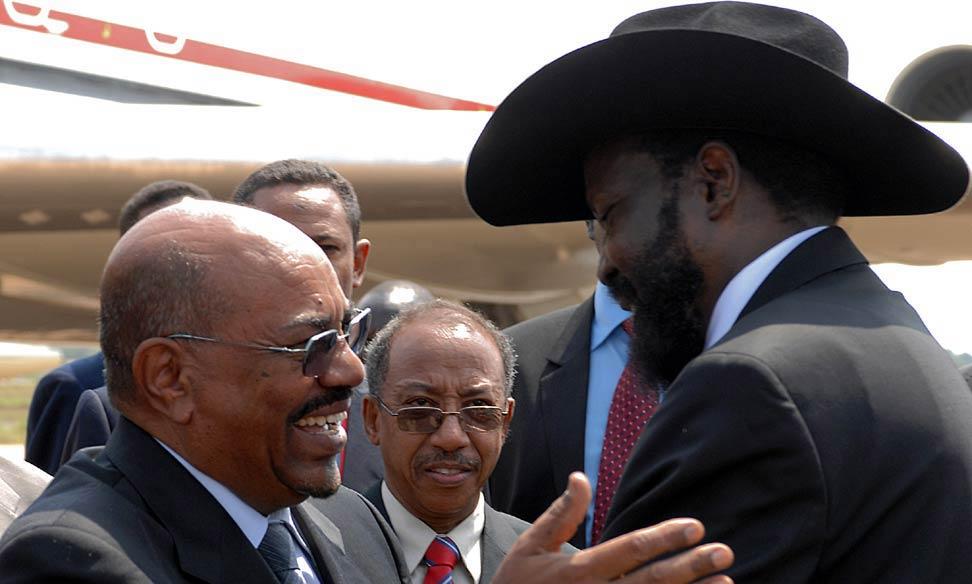Sudan and South Sudan: a civilised divorce – By Ahmed Badawi


Presidents Bashir and Kirr of North and South Sudan signed agreements last week strengthening their relations over oil, trade and contested border areas.
Divorce with kids involved is often a painful affair. But once the recriminations have been cast and the tears have dried, the two protagonists, it’s hoped, will work together for a common good: providing their children – and themselves – with a stable environment to move on and thrive. And that’s exactly what the slew of landmark cooperation agreements (see them here) just signed between the governments of the “˜Two Sudans’ represents for their respective populations, a year or so on from the birth of South Sudan.
The agreements herald the restart of oil exports, the abrupt halt of which since late January has sent both countries’ economies into the death-roll beloved of Nile crocs – the IMF predicts that Sudan’s economy alone will have shrunk 11 per cent by the end of 2012.
The agreements, however, are much less crude than that, and do not relate to oil alone. For example, an agreement for a demilitarised border zone signals the final act bringing the curtain down on what had been Africa’s longest running civil war, and, in turn, will buttress security across a huge swathe of the continent. Sudan and South Sudan together share borders with nine countries housing a third of Africa’s population. South Sudan President, Salva Kiir, dubbing the accords as “a great day in the history of the region” was not hyperbole.
Even so, several advocacy groups (see here, here and here) have greeted the agreements with scepticism, owing to unresolved border issues.
You’d have been mistaken for thinking those analysts would be happy with any peace deal – no matter how imperfect – following their frequent doom-mongering about an imminent resumption of full-scale war between the two sides.
Alas, no.
Nor, crucially, is the cynicism of the advocacy groups shared by those right here in the mix: the value of both the Sudanese and South Sudanese currencies rose considerably on the curb market following the accords and both have continued to strengthen since then.
Unresolved borders are hardly the exclusive domain of the Sudans either – and here they at least stand to be de-fanged as a potential source of armed strife by the aforementioned demilitarised zone. The freshness of the five spots of contention between the Sudan and South Sudan border always meant, too, that all outstanding issues would not get wrapped up as neatly as the U.S. government, in particular, had wished.
But sometimes it pays to kick a can down the road until you find a bin.
Nor are the five places necessarily the straw that many Sudan analysts have predicted will end up breaking the camel’s back. The reverse could easily prove true – Abyei and the other four contentious areas may act as pegs that fasten the tent. They are where Sudan and South Sudan blur, and embody the very culture of intermarriage, trade, and peaceful and mutually beneficial cooperation, envisioned in the “˜soft’ border accords allowing free movement of people and goods.
A case in point: aside from Abyei, care to name the other four disputed places? Precisely. Lost in the noise even in the flashpoint area of Abyei, which for the record is not oil-rich, intermarriage and peaceful coexistence between the Ngok Dinka and Sudan-leaning Misseriya tribe remains widespread.
The accords now leave the Sudanese government freer to focus – as it must – on speeding untrammelled international humanitarian access and achieving peace in the border areas of the Nuba Mountains and Blue Nile state, and redoubling efforts to bring comprehensive peace to Darfur as well. But like any divorce settlement, support from concerned friends has a big role to play in making the new state of affairs viable for all too.
Quick and comprehensive relief on Sudan’s unsustainable foreign debt (set to hit some US$44 billion by end of this year) from its international creditors is thus an urgent imperative; ditto lifting U.S. economic sanctions off Sudan, starting with the thicket tied to its’ politicised and wholly unjustifiable inclusion on the U.S. terrorism list. In doing so, the USA, which has devoted more than all others to this corner of the world, would get more slack to concentrate on building-up South Sudan, as it must, and keeping it upright.
Divorce is never bump-free. Change is never easy.
So, the U.S.A. and other key international stakeholders must now help both Sudan and South Sudan move beyond their acrimonious past, adapt swiftly to the new circumstances, and promise of a brighter future for both, heralded by their agreements.
Ahmed Badawi has written and advised extensively on country and reputational risk on Sudan at The Economist Intelligence Unit, Dun & Bradstreet, Fitchratings, Kroll, and WeberShandwick GJW, Public Affairs. He is the former Middle East and Africa spokesperson for the International Finance Corporation (IFC) and the speechwriter for the Government of Sudan during the north-south Sudan peace talks. He provides strategic counsel to the Government of Sudan and is Managing Director of The Sudan Centre for Strategic Communications, based in Khartoum.






[…] Sudan and is Managing Director of The Sudan Centre for Strategic Communications, based in Khartoum. African Arguments Share this:ShareTwitterFacebookLike this:LikeBe the first to like this. This entry was posted in […]
[…] productive relationship between the two states, heralding the “brighter future†Ahmed Badawi describes. But it could easily be a false dawn, in a relationship still beset with […]
[…] Grenzkonflikt und die umstrittene Region Abyei bleiben indes bestehen. Dennoch, von einer “zivilisierten Scheidung” spricht ein Blogpost bei den africanarguments. In diesem Zusammenhang sei außerdem auf die […]